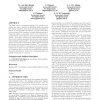Free Online Productivity Tools
i2Speak
i2Symbol
i2OCR
iTex2Img
iWeb2Print
iWeb2Shot
i2Type
iPdf2Split
iPdf2Merge
i2Bopomofo
i2Arabic
i2Style
i2Image
i2PDF
iLatex2Rtf
Sci2ools
ATAL
2011
Springer
2011
Springer
Multi-criteria argument selection in persuasion dialogues
The main goal of a persuasion dialogue is to persuade, but agents may have a number of additional goals concerning the dialogue duration, how much and what information is shared or how aggressive the agent is. Several criteria have been proposed in the literature covering different aspects of what may matter to an agent, but it is not clear how to combine these criteria that are often incommensurable and partial. This paper is inspired by multi-attribute decision theory and considers argument selection as decision-making where multiple criteria matter. A meta-level argumentation system is proposed to argue about what argument an agent should select in a given persuasion dialogue. The criteria and sub-criteria that matter to an agent are structured hierarchically into a value tree and meta-level argument schemes are formalized that use a value tree to justify what argument the agent should select. In this way, incommensurable and partial criteria can be combined. Categories and Subjec...
ATAL 2011 | Decision Theory | Intelligent Agents | Knowledge Representation Formalisms | Meta Level |
| Added | 12 Dec 2011 |
| Updated | 12 Dec 2011 |
| Type | Journal |
| Year | 2011 |
| Where | ATAL |
| Authors | Thomas L. van der Weide, Frank Dignum, John-Jules Ch. Meyer, Henry Prakken, Gerard Vreeswijk |
Comments (0)

